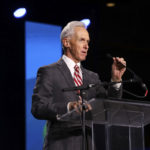WACO—The prevalence and severity of hunger is a “litmus test” revealing the health or sickness of a society, said Jeremy Everett, founding executive director of the Baylor Collaborative on Hunger and Poverty.
In spite of its vast resources, Texas has the second-highest rate of household food insecurity in the nation, Everett noted.
“That is an abomination,” he said.
So, Everett announced plans to launch the Hunger-Free Texas campaign during his keynote address to the Together at the Table Hunger and Poverty Summit on the Baylor University campus.
He told participants at the gathering he assumed they want to ensure children have access to food and adults have work to sustain their families.
He also said he assumed they recognize working together “is a better path forward than the mean-spiritedness and vitriol that we see from our politicians, our podcast preachers, our political commentators and endless amounts of social media posts.”
Hunger is too large and complex a problem for any individual or any sector of society to tackle alone, he noted. It requires the cooperation of broad-based coalitions.
‘America at its best’
Everett cited the Meals-to-You program as an example of the public and private sectors working together to fight hunger.
The Texas Hunger Initiative—predecessor to the Baylor Collaborative on Hunger and Poverty—and the U.S. Department of Agriculture piloted the program in 2019 as a way to provide home-delivered food boxes to rural children who lacked access to Summer Meal sites.
Sign up for our weekly edition and get all our headlines in your inbox on Thursdays
With logistical help from McLane Global, the Baylor Collaborative and USDA delivered more than 32,000 boxes of food to children in selected rural counties that summer.
During the COVID-19 pandemic the next year, USDA asked the Baylor Collaborative to increase the scale of the program exponentially to meet the needs of children in rural areas nationwide.
Between March and August 2020, the program delivered 38.7 million meals to more than 270,000 rural children in 43 states and Puerto Rico.
The initiative involved the cooperation of UPS, McLane Global, PepsiCo and other private sector partners, working with the Baylor Collaborative, USDA and Congress as part of the federal government’s pandemic response.
The program received bipartisan support in Congress. Some delivery drivers voluntarily relocated to remote areas to ensure children received the food packages regularly, Everett noted.
“That’s America at its best,” he said.
‘No chance if we don’t work together’
In response to the needs in Texas, Everett challenged participants at the Together at the Table event to organize hunger-free community initiatives where they live; to promote USDA programs such as WIC, SNAP and Summer Meals so they are fully utilized; and to advocate for the full funding of those and other programs.
“Candidly, the need we are coming upon today is going to be so severe that we have no chance if we don’t work together,” Everett said.
The Baylor Collaborative plans to visit all of the 254 counties in Texas and work with all 1,200 of the state’s school districts in the next five years to help implement the Hunger-Free Texas campaign, he announced.
For followers of Jesus, responding to the needs of hungry people is not optional, Everett emphasized. It is visible measure of the depth of Christian faith.
Everett reminded participants at the gathering of the events recorded in Luke 4.
When Jesus read in the Nazareth synagogue the text from Isaiah about bringing good news to the poor, proclaiming release to the captives and recovery of sight to the blind and letting the oppressed go free, he announced, “Today this scripture has been fulfilled in your hearing.”
After he finished, the people in the synagogue not only rejected Jesus’ “radically inclusive” message, but also drove him to the edge of the town, and some wanted to hurl him off a cliff.
“Jesus came announcing deliverance, but it wasn’t national deliverance. He wasn’t promoting an Israel first political agenda. It was instead God’s promise of liberation for all people—for all the oppressed, regardless of their nationality, gender or race,” Everett said.
“Jesus’ allegiance is not to a particular tribe, nation or religion. His allegiance is to the kingdom of God—to Jubilee for the poor, the hungry and the disinherited.”
When anyone excludes the poor and oppressed, they are excluding themselves from God’s blessing, he asserted.
“When we see the poor, hungry or migrant as ‘other,’ and when we choose to limit grace to those who meet our standards of being deserving, we find ourselves in solidarity with those who tried to push Jesus off a cliff and later placed him on the cross,” Everett said.
“How much more might God be able to do with us if we were ready to transcend the boundaries of our tribes, our political parties, our denominations and our limitations of love that we ourselves have constructed. … The kingdom of God is here, and there is room at the table for everyone, but only when we make space for all people who are in need.”
















We seek to connect God’s story and God’s people around the world. To learn more about God’s story, click here.
Send comments and feedback to Eric Black, our editor. For comments to be published, please specify “letter to the editor.” Maximum length for publication is 300 words.